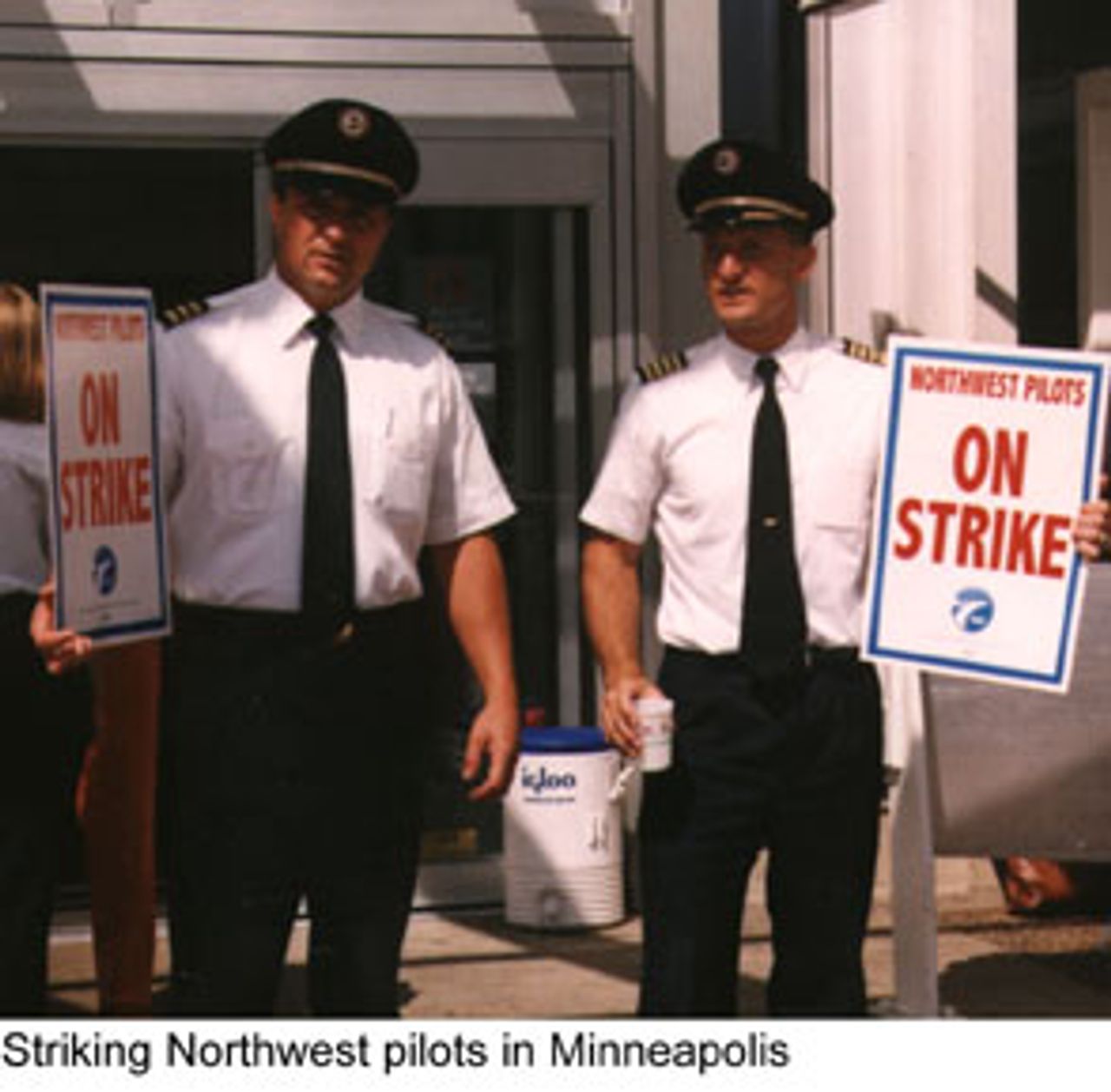 The Clinton administration has increased its role in the 13-day-old pilots strike against Northwest Airlines, dispatching White House deputy counsel Bruce Lindsey, one of the president's top advisers, to participate in negotiations. Lindsey flew to Minneapolis September 8 along with Transportation Secretary Rodney Slater.
The Clinton administration has increased its role in the 13-day-old pilots strike against Northwest Airlines, dispatching White House deputy counsel Bruce Lindsey, one of the president's top advisers, to participate in negotiations. Lindsey flew to Minneapolis September 8 along with Transportation Secretary Rodney Slater.
The same day Slater and Attorney General Janet Reno announced they would file a lawsuit against Northwest Airlines and Mesaba for rejecting a Transportation Department order instructing the carriers to resume commuter service. Mesaba and Express Air, which serve as Northwest connectors, suspended operations at the start of the strike. The airlines are the only air links to some 17 smaller cities, principally in the upper Midwest. Northwest owns 100 percent of Express Air and 30 percent of Mesaba.
The Transportation Department ordered Mesaba and Express Air to resume commuter flights based on rules adopted at the time of airline deregulation in 1978 aimed at ensuring that smaller communities not be deprived of airline service. However, Northwest and Mesaba opposed the Transportation Department order. In its official reply Northwest pointed to a clause in its contracts with Mesaba and Express Air that exempt it from any obligation to supply support services, such as ticketing and baggage handling, during a strike. It further declared that it would be 'economic suicide' for the commuter airlines to resume operations.
Express Air was exempted from the pending federal lawsuit after it agreed to 'evaluate' the possibility of resuming service. Express Air pilots are members of a separate bargaining unit from Northwest pilots. Under terms of their contract they remain on half-pay during the first 14 days of a shutdown.
A forced resumption of service would create a situation where unionized Northwest workers, currently laid-off, would have to cross pilots' picket lines. It would also serve to undercut solidarity between Northwest pilots and the generally lower paid pilots at the commuter airlines. One of the key issues in the pilots' strike is Northwest's insistence on farming out jobs to low-cost carriers.
Government action to force the restarting of Mesaba could be the first step toward more decisive federal intervention, including a presidential return-to-work order against pilots, under the guise of protecting the 'public interest.'
Two other unions, the International Association of Machinists, which represents ground service workers and mechanics, and the Teamsters, which represents flight attendants, also have contracts pending with Northwest. Federal mediators have thus far not acted on a request by the IAM to declare an official impasse in negotiations. Under federal law once an impasse is declared airline unions can strike after a 30-day waiting period has elapsed.
There are signs that the pilots' union, which to this point has opposed federal involvement, is looking to the Clinton administration to get it off the hook by imposing a settlement of one sort or another. One pilot negotiator quoted in the Detroit News declared, 'Both parties are deeply ingrained in their positions. It's probably going to take presidential intervention to end this thing.'
Negotiators for Northwest and the Air Line Pilots Association met face to face September 8 under the auspices of a federal mediator. The talks are being held amid tight security and a news blackout, indicating concern that pilot negotiators be insulated from potential pressure from the rank and file. Negotiators for both sides have been placed under a gag order by the National Mediation Board.
Joining the Northwest negotiators was Northwest's newly appointed Executive Vice President and Chief Financial Officer Mickey Foret, who is also the airline's strike contingency coordinator. Foret was Northwest CFO from 1992 to 1996. In 1993 he helped extract concessions from the pilots and other Northwest workers.
Meanwhile, Northwest announced the layoff of 567 part-time reservation agents. This brings to close to 30,000 the number of Northwest workers laid off due to the pilots' walkout. Management also announced further flight cancellations, suspending all domestic flights through Friday and all international flights through the weekend.
Pressure continues to mount on Clinton to end to the pilot's strike. On September 7 Clinton met with North Dakota's three congressional representatives. North Dakota's two Senators and lone House member, all Democrats, have requested Clinton halt the strike because of damage to the state's economy. In a statement issued prior to the meeting Senator Bryon Dorgan said, 'We're going to tell him [Clinton] that we think it's urgent that the airline get up and operating again, because it's causing very serious damage. Perhaps binding arbitration is the way to go here.'
Two Republican Senators, Bill Frist and Fred Thompson of Tennessee, say they are going to introduce a resolution calling for presidential intervention if other measures fail to end the strike.
See Also:
The Northwest, Air Canada strikes and the globalization of the airline industry
[4 September 1998]
Minnesota governor calls for presidential intervention in Northwest strike
[5 September 1998]
Clinton's transportation secretary intervenes in Northwest Airlines strike
[2 September 1998]
